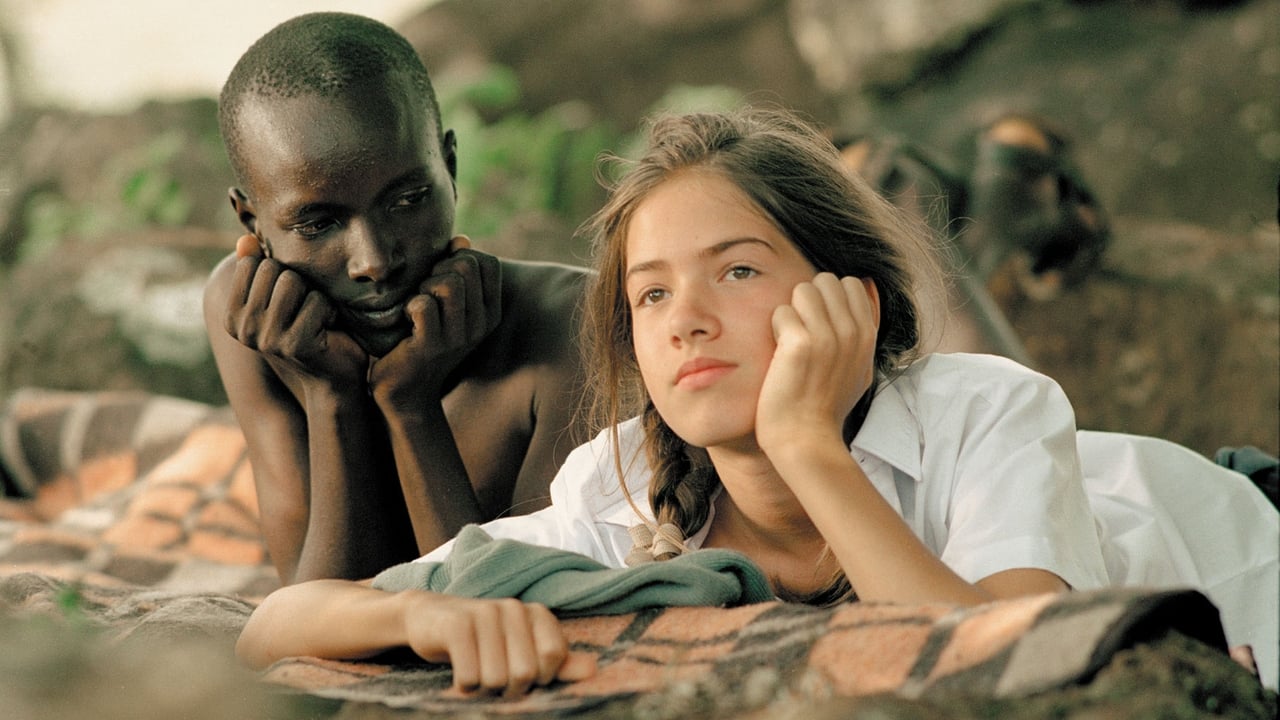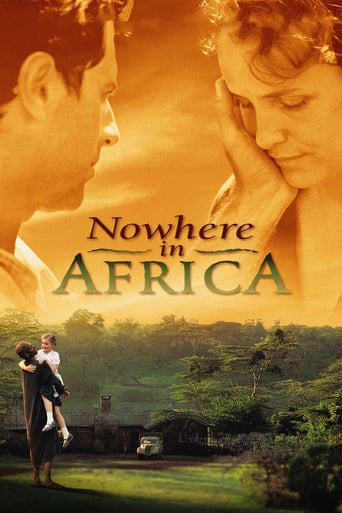

It's no definitive masterpiece but it's damn close.
... View MoreThis is a must-see and one of the best documentaries - and films - of this year.
... View MoreJust intense enough to provide a much-needed diversion, just lightweight enough to make you forget about it soon after it’s over. It’s not exactly “good,” per se, but it does what it sets out to do in terms of putting us on edge, which makes it … successful?
... View MoreIt's a good bad... and worth a popcorn matinée. While it's easy to lament what could have been...
... View MoreThe story opens in 1938, as Jews Jettel and her daughter Regina are preparing to escape Germany and join her husband who has found work in Kenya. Life on a poor farm in the bush is a shock to the spoiled Jettel, but 5 year old Regina loves it and the people, especially their loyal cook, Owuor. Over the next ten years, the family faces many challenges.This movie is based on the autobiography of the real Regina. With the war as a backdrop, it focuses on the relationship between her parents; she's selfish and stubborn, he's hardworking and loving, and their marriage is a difficult one. Regina has her own adjustments to make when she is sent away to boarding school. The one constant in her life is her beloved friend Owuor, and his scenes were the most touching for me.The movie is gritty and realistic. The actors appear to have no make-up and the photography uses mostly natural light which, unfortunately, made everything in the shadows look inky black. Another drawback for me was the editing; scenes jump from one to the other with no smooth transitions and there are many story lines that are never resolved. Since this is a true story, I would have liked to see an epilogue at the end telling about the family. It also seemed too long for me.It is a very interesting and poignant story about suffering and adjustment that conveys the horror of war without actually showing any footage. In German with subtitles.
... View MoreSometimes you watch a film and within the first few minutes, you understand the story, know where it is going, and know somewhat how it will end. It was this case with me when watching this film. You somehow know that the Redlich family will remain in Africa during the war, surving the best they can while their families will perish in Germany, and that after the war, they will return back to their homeland.It is in the richness of the details, the characters, the African people, landscape, that gives this movie its value. There are so many scenes in this movie that break your heart, and so many that fill it, that by the end of the film, you've really felt you've been someplace, and that you've traveled in good company.
... View MoreI love foreign films as it is, but I thought this film "Nowhere in Africa" was really good. I found myself feeling just like the woman who left Germany (to escape) who then found herself in a foreign land of Africa to then find herself becoming apart of the country. I'm sure many people went through this, and it still amazes me that the Holocaust happened in this century. It really hasn't been THAT long ago. This movie doesn't focus on the Holocaust, it gives you a different angle from those who lived it in a different way. I thought the little girls attitude on life was great as well.I miss Owuor and his ways, I enjoyed watching him converse with anyone in the film.
... View MoreI did find Nowhere In Africa more absorbing upon a second viewing. It's sneaky. When I watched it a second time, I felt more at ease with the characters, and because of that I found myself able to absorb myself in their problems (and in the way they see them) more completely and to imagine their lives much more fully. Yet this film, beautiful as it is, is more a narrative string, a series of scenes, than a drama. It's not that there is a shortage of drama in the idea - or ideas, for there are many - it is just that the drama is not concentrated on any of the various story lines that keep tantalizing us. They tantalize but are never realized, at least not to the full extent they could have been. The director should have taken one or two of the themes she has here and delved into them much more thoroughly. What we have are a number of interesting sketches but never a full canvas. That does not mean that the movie is without its moments (the brilliant young German daughter speaking with the British school headmaster was one such moment, wonderful), but as a viewer I kept wanting more out of each relationship, both between the humans, and between the humans and the place itself. Too much of the film is a kind of mystery without any solution. The shorthand the director uses to tell us her story feels more like an outline for a movie than a real movie. It's a beautiful trailer that goes on for 140 minutes: time aplenty to have told us a really great story. Nonetheless, I do recommend this film. It is visually quite stunning, and the performances are universally good. A solid 3 stars.
... View More